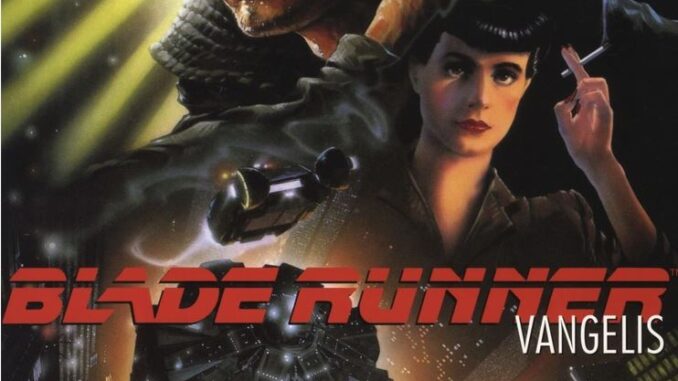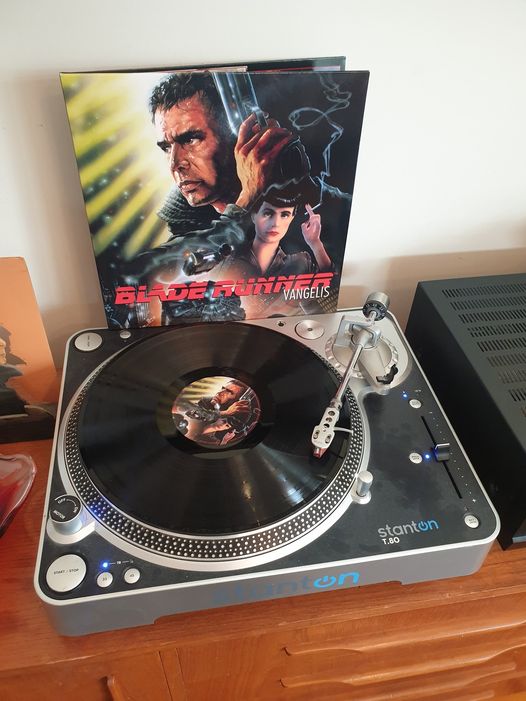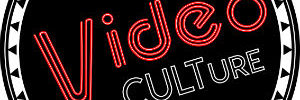
By Steve Tupai Francis (Twitter: @kingtubbydub)
The quintessential soundtrack, written and performed by the Greek super-god of the synth, Vangelis (known to his mum as Evángelos Odysséas Papathanassíou).
Vangelis pioneered the use of synthesizer as a key tool in the creation of sonic soundscapes for film (Chariots of Fire (1981), 1492: Conquest of Paradise (1992), Alexander (2004), The Bounty (1983)), television (Cosmos (1975)) and for the charts (numerous solo albums, and collaborations with Jon Anderson of the band Yes (Jon and Vangelis: Friends of Mr Cairo [1982]).
If you hadn’t seen Blade Runner (1982), the dark, dystopian sci-fi film noir by Ridley Scott, with its arresting images of perpetual night, neon glow, persistent acid rain, dilapidated and crumbling deco structures, and future noir seediness, you would be able to conjure these visions into your mind just by listening to Vangelis’s soundtrack. (By the way, I find it hard to conceive of anyone who has NOT seen Blade Runner!).
Fresh off an Academy Award in 1981 for his soundtrack to the British film, Chariots of Fire, Vangelis was at the top of his game when he was asked by Sir Ridley to create a soundtrack for his downbeat classic melding of science-fiction and Raymond Chandler (although for contractual reasons, the album remained unreleased for 12 years).

The ice-cold synth-scapes evoke the crumbling façade of a future Los Angeles inhabited by those unable to migrate to the off-world colonies. The chilling and lonely sounds conjured by Vangelis from his bank of keyboards, also serve to highlight the isolation of the individual for those dwelling in the impersonal, implacable and uncaring world that the crowded denizens are forced to reside in, side by side, yet totally unknown to each other. People seem to only interact to get something for themselves (food, sex, entertainment). It’s an all-take, no-give world.
This dystopian city of the future past is also a melting pot of the remaining humans, cultures, and even animals of the world. The soundtrack reflects some of this as well. Most notably in the song “Tales of the Future” performed in an almost Arabic sounding patois by the one and only Demis Roussos (who formed a prog-rock outfit with Vangelis in their 60’s in Greece).
On the flip side, some musical themes also evoke a nostalgic warmth, an echo of the Chandlerian noir elements of the film. This is particularly so in the scenes between Deckard’s (Harrison Ford) and Rachael (Sean Young). Best exemplified by “Love Theme” (with Dick Morrissey on sax), “One More Rainy Day” and “Rachel’s Song’” (sung by Mary Hopkin, famous for her ‘60s hit, “Those Were the Day’s.”
The theme for the “End Titles’ is the only time that Vangelis goes a bit Chariots of Fire on the soundtrack. But it’s appropriate for the end sequence where (spoiler alert for the one person on the planet who hasn’t seen Blade Runner yet) Deckard and Rachel escape in a Spinner to their new life together. (Film Trivia Alert: the closing titles were actually outtakes from Stanley Kubrick’s, The Shining).
Vangelis’ juxtaposition of synthetic sounds with warm, romantic songs evocative of the ’30s is also an aural metaphor for the main theme of the film: what is real and what is synthetic, and does it matter?
Rarely has a film soundtrack and the film itself been so interconnected, one with the other. Rightfully, the soundtrack concludes with Rutger Hauer’s haunting soliloquy in his final moments of (artificial) life. Hauer wrote the heart-rending “Tears in Rain” speech himself.
#videocultureOSTreviews
